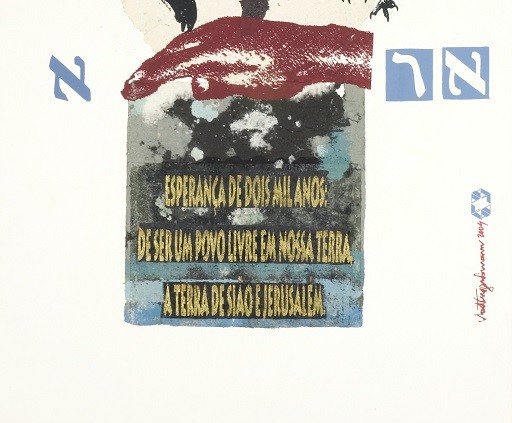A espada e o chapéu vermelho
o vestuário dos médicos judeus no Império Otomano
DOI:
https://doi.org/10.35699/1982-3053.2023.47629Palavras-chave:
História do vestuário, Médicos judeus, Império OtomanoResumo
As fontes judaicas que descrevem o vestuário não médico e acessórios de médicos são escassas. O artigo atual concentra-se no traje de médicos judeus no Império Otomano nos séculos XVI-XIX. Dois problemas principais relacionados aos itens de vestuário usados por médicos judeus otomanos são evidentes: o chapéu usado pelos médicos e a prática de portar uma espada. Testemunhos escritos e ilustrações indicam que, ao contrário de outros homens judeus que usavam um chapéu amarelo, os médicos judeus usavam um chapéu vermelho ou azul, cores consideradas mais prestigiosas. O chapéu alongado que usavam, no entanto, tinha uma forma diferente da dos médicos muçulmanos, de modo que podiam ser distinguidos de seus colegas.
Downloads
Referências
AMAR, Zohar; LEV, Ephraim. Physicians: drugs and remediesin Jerusalem from the 10th-18thCenturies. Tel-Aviv: Eretz publication, 2000.
BAT YE'OR. TheDhimmi.NJ: Fairleigh Dickinson University Press, 1985.
BENAYAU, Meir.To the History of the batei Midrash in Jerusalem in the 17thCentury.Hebrew Union College Annual, XXI (The Hebrew Part), p. 1-28,1948.
BROWER, Abraham Jacob.New Material for the Knowledge of the Damascus affair.Jubilee bookof Samuel Krauss.Jerusalem: Reuven Mass, p. 260-279, 1937.
BRYAN, Michael.Bonnart, Henri. In:GRAVES, Robert Edmund (ed.).Bryan's Dictionary of Painters and Engravers (A–K). v.I (3rded.). London: George Bell & Sons,1886.
DEUTSCHER,Lisa;KAISER, Mirjam; WETZLER, Sixt. The sword: form and thought.New York: Boydell Press, 2019.
DRIANOV, Alter.From Early Times, Vol. II, Tel Aviv: Shoshani Press, 1935.
GARDET,Louis. La Cite Musulmane:Vie sociale et politique.Paris: Etudes musulmanes,1954.
ḤAGIZ, Moses. Ele ha-Mitzvot.Warsaw: Meir Yeḥiel Press, 1887.
HAREL,Yaron.The Status and Imageof the Piccioto Family as Perceived by Aleppo's French Colony(1784-1850).Michael, 14, p. 171-186,1997.
HEYD,Uriel.Moses Hamon, Chief Jewish Physician to Sultan Süleymān the Magnificent.Oriens, 16, p. 152-170, 1963.
JONES, Robert W. A cultural history of the medieval sword: power, piety and play. NewYork: Boydell Press, 2003. JUHASZ,Esther.The Jewish dress in encounter with the Surroundings. In: JUHASZ, Esther; BAR'AM-BEN-YOSSEF,No'am (Eds.).The Jewish Wardrobe: fromthe Israel Museum Collection.Jerusalem: Israel Museum,p. 15-30, 2014.
KAWTHARANI, Wajih. 2018. The OttomanTanzimatand the Constitution.AlMuntaqa, 1[1], p. 51-65, 2018.
MURPHY,Rhoads. 1992. Ottoman Medicine and Transculturalismfrom the Sixteenth through the Eighteenth Century.Bulletin of the History of Medicine, 66, p. 376–403.
NICOLAS DE NICOLAI. Les quatre premiers livres des navigation et peregrinations orientales.Lyon: Guillaume Rouillé, 1568.
PROMKIN, Arye Leib. The History of Jerusalem Sages.v. II. Jerusalem: Eliezer Rivlin edition, 1928.
RAY, John. Acollection of curious travels & voyagesintwo tomes. The firstcontaining Dr. Leonhart Rauwolff’s itinerary into the Eastern Countries, as Syria,Palestine, or the Holy Land, Armenia, Mesopotamia, Assyria, Chaldea & c. London: Fell. of the Royal Society,1963.
ROGER, Eugène.La Terre Sainte, ou, description topographique tres-particulier des saints lieux, & de la terre de promission.Paris:Antoine Bertier, 1646.
RUBENS, Alfred.A History of Jewish Costume. New York: Funk & Wagnalls, 1967.
SHEFER-MOSSENSOHN,Miri. Medical Treatment in the Ottoman Navy in the Early Modern Period.Journal of the Economic and Social History of the Orient, 50[4], p. 542-568, 2007.
YA’ARI,Abraham. Shluḥe Eretz Israel. Jerusalem: Mossad ha-Rav Kuk, 1951
Downloads
Publicado
Edição
Seção
Licença
Copyright (c) 2023 Arquivo Maaravi: Revista Digital de Estudos Judaicos da UFMG

Este trabalho está licenciado sob uma licença Creative Commons Attribution 4.0 International License.
O autor cede os direitos autorais à revista Arquivo Maaravi. Os direitos de licenciamento utilizados pelo periódico estão sob a Licença Creative Commons do tipo atribuição BY: são permitidos o compartilhamento (cópia e distribuição do material em qualquer meio ou formato) e adaptação (remix, transformação e criação de material a partir do conteúdo assim licenciado para quaisquer fins, inclusive comerciais.











